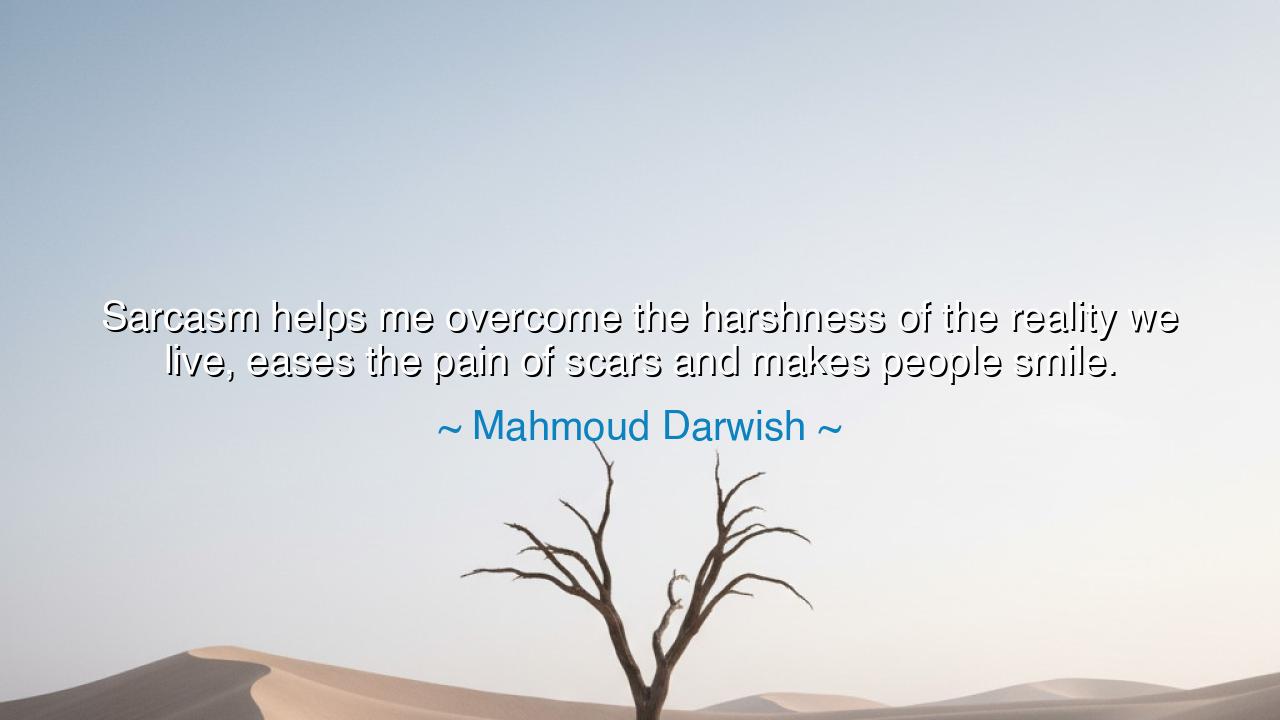
Sarcasm helps me overcome the harshness of the reality we live
Sarcasm helps me overcome the harshness of the reality we live, eases the pain of scars and makes people smile.






Hear now the words of Mahmoud Darwish, poet of exile, singer of sorrow, and voice of his people: “Sarcasm helps me overcome the harshness of the reality we live, eases the pain of scars and makes people smile.” These words are not born of frivolity, nor of light jesting, but of survival. For Darwish, who lived through war, loss, and displacement, the weapon of the tongue became sharper than the sword, and the tool of irony became a shield against despair. His sarcasm was not cruelty, but medicine; not mockery, but a way to laugh in defiance of suffering.
The ancients also knew this art. In Greece, Aristophanes wrote comedies that clothed truth in satire, exposing the corruption of rulers while making the people laugh. In Rome, Juvenal wielded sarcasm like a spear, striking at injustice through irony, so that laughter became rebellion. And even among the prophets of old, there was often irony—words that cut, words that mocked the powerful, yet carried hope for the powerless. Darwish stands in this same lineage: his sarcasm is not shallow entertainment, but a way of facing a harsh reality without surrendering to despair.
When Darwish says sarcasm “eases the pain of scars,” he speaks of wounds both personal and collective. The exile from homeland, the loss of freedom, the memory of suffering—these scars do not vanish. But through sarcasm, he lightens their weight, turning pain into something shareable, something less crushing. The wound becomes a story, the sorrow becomes a line of poetry that makes others smile, and in that smile, healing begins. Thus, sarcasm becomes not only defense, but also gift, a shared balm among those who suffer together.
Consider the story of Winston Churchill, who, in the darkest days of the Blitz, often used sarcasm and wit in his speeches. His sharp humor turned fear into courage, mockery into resilience. When Germany rained bombs upon London, he quipped that the enemy had "given us the opportunity to show our resolve." His people laughed, not because the bombs were less terrible, but because humor made the terror bearable. In this, he shared Darwish’s wisdom: irony can make the unbearable survivable.
The meaning of Darwish’s words is thus clear: sarcasm is not an escape from reality, but a way of confronting it with dignity. When the world is cruel, sarcasm refuses to let cruelty have the last word. When scars weigh heavy, sarcasm transforms them into stories that give strength. And when despair threatens to silence us, sarcasm breaks through with laughter, reminding us that even in darkness, the human spirit still shines.
The lesson we must carry is this: do not despise humor, even the sharp humor of irony. It is not always cynicism; it can be resilience. Learn to laugh in the face of hardship, not because hardship is small, but because your spirit is greater. Practice sarcasm not to wound others, but to protect yourself, to speak truth without fear, and to ease the burdens of those around you. For a well-placed word of irony can lift a friend’s spirit more than solemn comfort ever could.
Practically, this means cultivating the art of joyful defiance. When life wounds you, do not only groan—smile, jest, turn the pain into a story that strengthens rather than crushes. When reality is harsh, use humor to keep your dignity intact. And when others suffer, let your sarcasm bring them laughter, not bitterness. In this way, you join the lineage of poets, philosophers, and leaders who turned words into shields against despair.
Thus, let Darwish’s words be passed down: “Sarcasm eases the pain of scars and makes people smile.” It is not a mask to hide truth, but a sword to wield it; not a denial of wounds, but a way to live with them. For laughter in sorrow is one of humanity’s greatest powers—it tells the world: you may wound us, but you will never break us.






AAdministratorAdministrator
Welcome, honored guests. Please leave a comment, we will respond soon